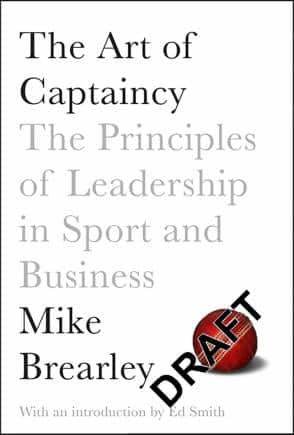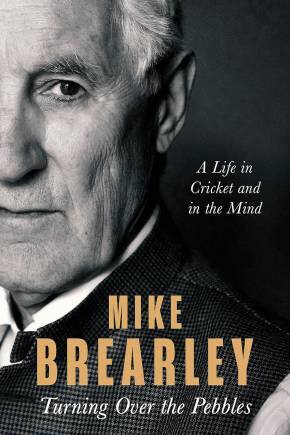
Mike Brearley is widely regarded as the one of the greatest cricket captains ever. He was one of the few players in the history of the game who earned his place in the side almost solely for his captaincy skills rather than his batting, bowling or fielding talent. In the 39 Tests that he played for England, his batting average was 22.9 with not a single century—certainly not great figures for an opening batsman.
 Pan; 30th ed., 416 pages.
Pan; 30th ed., 416 pages.But in the 31 Tests that he led England, he won 18 and lost only four—a sterling record. He seemed to possess an uncanny ability to inspire his teammates and read the minds of opponents. I know several CEOs who believe that his 1985 book The Art of Captaincy should be a prescribed text in business schools for aspiring leaders, for its keen understanding of tactics, strategy and the human mind.
But then, Brearley is an unusual figure among sportsmen. He studied the Classics—Greek and Latin—and philosophy at Cambridge University, topped the British civil services examination but then decided to not be a bureaucrat. He pursued a PhD that he never completed—his thesis was supposed to be titled “An Explanation of Action”. He taught philosophy at the University of Newcastle-on-Tyne for a few years, during which time British intelligence tried to hire him as a spy, but he declined because he did not want to live “in a world of constant deception”.
In 1971, at the age of 29, he resigned from his teaching job to become a professional cricketer as the captain of the Middlesex team. In 1976, he was selected to the England Test team directly as its vice-captain.
But even as he was playing and winning games for England, he was training for another vocation. After retiring in 1982, he began a new career as a psychoanalyst and rose to the top of the profession, including being elected president of the British Psychoanalytical Society. He also has a strong India connection—his wife is a niece of the late Vikram Sarabhai. The Brearleys spend at least two months in India every year.
His latest book Turning Over The Pebbles is sub-titled “A life in cricket and the mind”. Some cricket fans will certainly be disappointed to know that this memoir has much less to do with cricket than with the mind—only one of its 14 chapters is exclusively devoted to the game. Instead, the book is a thoughtful meditation on life, sport, philosophy, psychology, religion, literature, music, death—in fact the whole human condition. Brearley, now 81 years of age and a cancer survivor, describes it as a memoir of his mind.
 Constable; 304 pages.
Constable; 304 pages.
That mind is a voracious one. The “selected bibliography” at the end of the book ranges from Homer to Bob Dylan, Shakespeare to Hans Christian Anderson, Tolstoy to Freud. There are long stretches analyzing the novels of Henry James, the insights of the great Austrian philosopher Ludwig Wittgenstein and various psychoanalytical theories. Pebbles is the story of a lifelong interdisciplinary quest by an inquiring and intelligent man to make sense of life, the universe and everything.
Though Brearley does not believe in either the supernatural or the afterlife, he finds strong overlaps “between religious thinking and psychoanalysis, while being aware of the ways in which religion has a philosophy that goes beyond that of psychoanalysis, making bigger claims and offering more exalted hopes than what therapy proposes”.
Similarly, between literature and psychoanalysis. Great novelists, he writes, “take us inside their characters. And thus a little further inside ourselves… Novels expand my idea of the self and its depths… One special feature of novels for both reader and writer is getting into the minds of others, real and imaginary. There is joy in this expansion.”
In his youth, he had been trained in the strictly logical grammar of Greek and Latin, yet at one point, he posits that some types of “vagueness of thought” may be more productive in a creative way than some types of “dry precision”: “Vagueness includes open-endedness, a range of possible meanings. It may offer space for the conversation to continue in the mind and voice of the other. It is not prescriptive or autocratic.”
Brearley has lived two lives, one as a cricketer and the other as a psychoanalyst, but he can easily link the two professions: “Cricket… has long formed for me a central setting for issues of selfishness and altruism, of loyalty to the team but also to the self... Cricket (has provided) a frame for thinking about my life. It has structured my thinking and feeling. Psychoanalysis has given me a sense of the confluence of general fears and insecurities with their cricketing counterparts.” In fact, he says that playing cricket and captaining taught him a lot about how people think and got him deeply interested in psychology.
Inevitably, Pebbles ends with his thoughts on death. He was diagnosed with cancer in 2019 and has survived. He is worried that his mind may be deteriorating—both his parents suffered from Alzheimer’s in their old age. He says that he does not fear death, and then asks himself whether he is too comfortable, complacent, perhaps even too frightened to acknowledge and encounter that fear. He wonders whether he will live to see another month of May when the cricket season begins in England, another summer solstice, another autumn equinox. “And yet, no two minutes are exactly alike,” he writes. “Perhaps I can be alive at my own death.”
May the fascinating mind of Mike Brearley see many more solstices.
Discover the latest Business News, Sensex, and Nifty updates. Obtain Personal Finance insights, tax queries, and expert opinions on Moneycontrol or download the Moneycontrol App to stay updated!